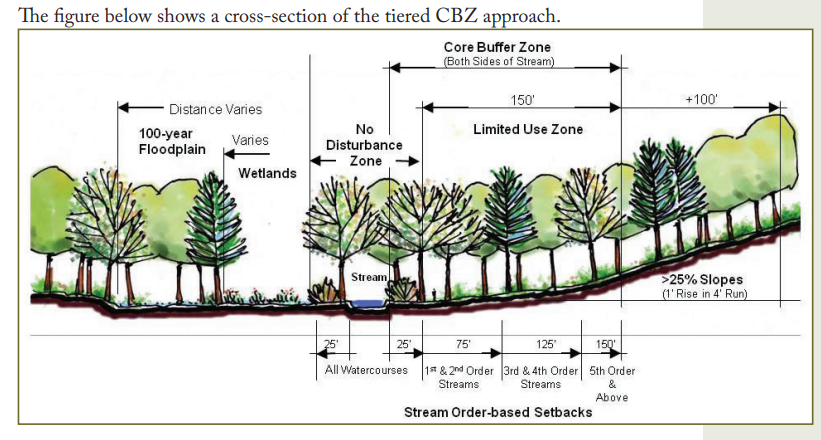Source Water – Can’t Drink What You Don’t Have
This article explains the importance of preserving and protecting the source of your drinking water. Whether a pond, lake, or stream, or that field along the river where your wells are located, drinking water sources must be managed to maintain their long-term integrity. Maintaining and protecting our source water is the most crucial step to ensure an adequate, safe, and economical supply.
There are two basic ways to protect your drinking water source, all tied to how we manage our land:
Zoning. Thoughtful and effective land use controls balance demand for development with ecosystem services that maintain town health and beauty. Maintaining a natural vegetative buffer is the most effective way to ensure clean surface water, with buffer sizes adjusted according to various factors (see graphic from Newfound Lake model ordinance). Keeping total impervious surface areas (roofs, roads, parking lots) below 10% in groundwater recharge areas allows rain and snowmelt to replenish aquifers and reduces flooding.
Land Conservation. Land conservation is used to control future land use in perpetuity. Typically, rights to develop conserved lands with buildings and structures are sold or donated, while maintaining agricultural, wildlife habitat, and low-impact recreational uses are allowed. Many towns have created public forests and lands to protect their watersheds, and some even generate revenue from professionally managed timber harvests.
For more information about source water protection, consider registering for the NH Department of Environmental Services’ annual workshop on May 24 and 25, 2022.
Because “zoning” is a hot-button topic, it takes political will and persistence to effectively engage our fellow citizens around land use. The good news is everyone agrees that clean water is a good thing – it
just takes some time and effort to realize and accept the tradeoffs between unfettered land use and a sustainable, resilient water supply.
Win with Water! is an informational series to raise awareness and provide actionable steps to public water system managers, administrators, and policy makers.

